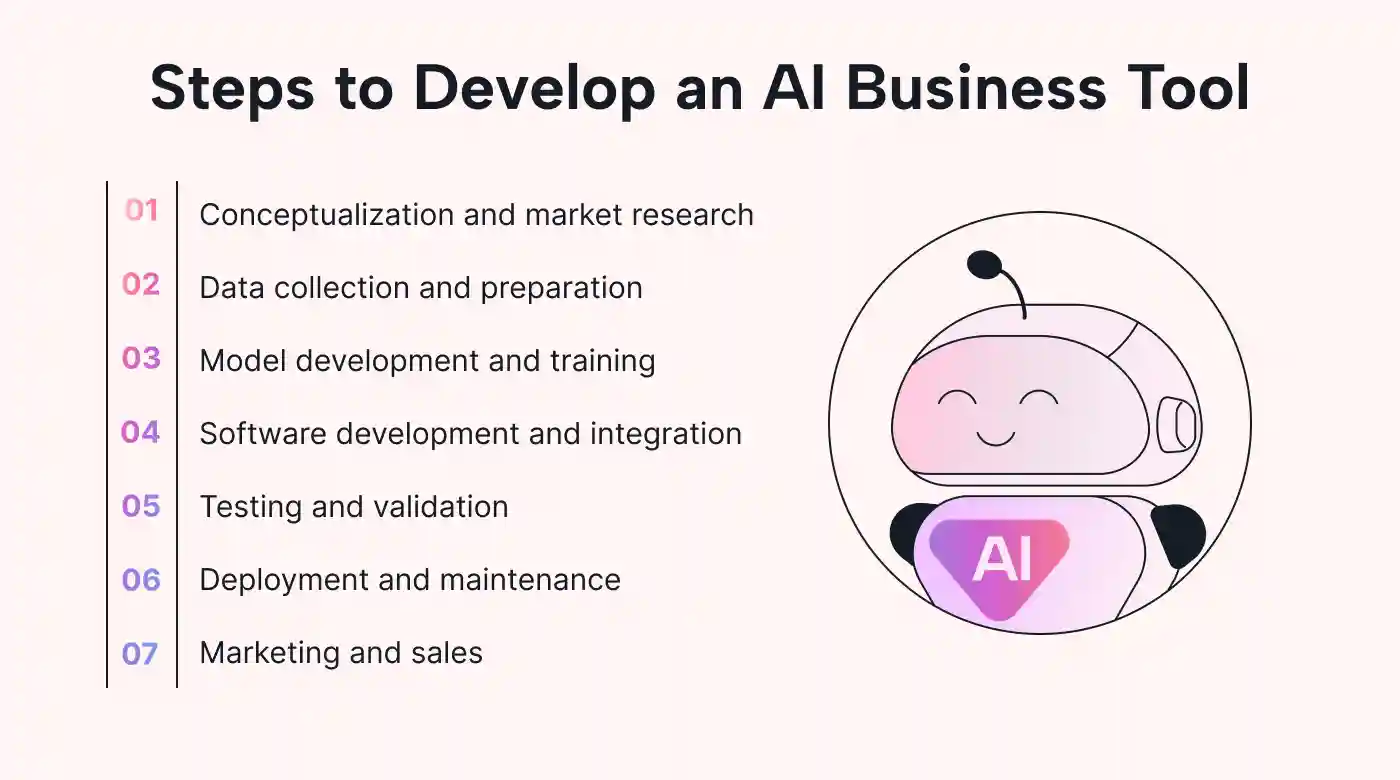The power of artificial intelligence puts forward-thinking entrepreneurs at an advantage today. AI can unlock new revenue streams and transform the way companies operate practically overnight.
But it’s not just about the massive potential. Right now, all eyes are on AI. Creating a useful AI-powered tool that people can use to help them grow their businesses or get more out of their lives can put your company on the map.
If you’re an innovative business owner or startup founder, let’s just say you were born into the right era. All you need are some great ideas and startup capital to tap into the new market of AI-driven tools.
This article explores 30 practical, profitable AI business ideas across 11 different industries. Let them inspire you to discover new opportunities that fit your business goals.
What is an AI tool?
AI-powered tools are software applications or platforms that use AI to automate, enhance, or perform tasks that would typically require human intelligence.
These tools leverage machine learning, natural language processing, and other AI techniques to analyze data, make informed decisions, predict outcomes, or provide valuable insights into operations. They are designed to improve efficiency, accuracy, and productivity in many fields, including healthcare, finance, customer service, marketing, AI sales automation and more.
There’s significant income potential in this space. This global market is estimated to grow from USD 19.5 billion in 2023 to USD 91.6 billion by 2028.
The North American share of this huge pie was USD 7.1 billion in 2023. This figure is estimated to expand to an incredible USD 30.4 billion by 2028.
With this much money on the line, a lot of businesses are looking into AI software development.
30 AI business ideas with serious potential
In this section, you’ll find a wide range of practical, profitable AI business ideas for small and mid-sized businesses and startups.
We’ve grouped these ideas by industry, spread out over 11 promising fields for AI applications. While our list is by no means exhaustive, these ideas will give you a good sense of the opportunities that are out there.
We’ve also added some ballpark figures for profit potential based on current market trends and AI capabilities. These figures are very rough estimates and can vary widely based on market conditions and the scale of your intended operations, but they’ll give you an idea of what’s possible.
Let’s take a look at 30 inspiring AI business ideas to help you channel your entrepreneurial spirit:
Medicine and health
Here are three AI business ideas in this fast-developing area:
1. AI-driven personalized nutrition plans
Develop an AI platform that analyzes individual health data to provide personalized nutrition advice.
Potential profit: $100K-$500K annually.
 |
2. Virtual health assistants
Offer AI-powered virtual assistants for medical professionals to reduce administrative workloads.
Potential profit: $200K-$1M annually.
3. Predictive health analytics
Use AI for predictive analytics in patient care. The goal is to detect or foresee health issues before they arise — helping patients stay healthier and save on medical expenses in the process.
Potential profit: $300K-$2M annually.
Technology and AI
Now for some inspiring business ideas in the technology sphere:
4. AI cybersecurity solutions
Create AI-powered systems that predict and counteract cyber threats to businesses. This is potentially a huge market, given the large number of cyber attacks that occur.
Potential profit: $500K-$3M annually.
5. AI-based software testing
Offer services for automated, AI-driven software testing that’s designed to improve the software’s efficiency.
Potential profit: $150K-$800K annually.
6. Smart home integration services
Design an AI solution to integrate various smart home devices smoothly, even if they’re created by different companies.
Potential profit: $200K-$1M annually.
Human resources
HR departments are another fertile field for AI business ideas. Here are some suggestions:
7. AI-powered recruitment tools
Develop AI tools for efficient resume screening and candidate matching.
Potential profit: $100K-$600K annually.
8. Employee performance analytics
Use AI to analyze and improve employee performance and satisfaction.
Potential profit: $150K-$750K annually.
9. Automated employee onboarding
Create systems for AI-guided employee onboarding to reduce the HR workload.
Potential profit: $120K-$500K annually.
Marketing and sales
Consider the following to improve marketing and sales operations:
10. AI-driven customer insights
Offer services for deep customer behavior analysis using AI algorithms.
Potential profit: $200K-$1.5M annually.
11. Chatbot services for customer support
Develop sophisticated AI-powered chatbots for customer service. Though these kinds of bots are already in service, there’s lots of room for improvement in how they interact with customers.
Potential profit: $100K-$700K annually.
12. Personalized marketing content creation
Think of AI tools as creators of inexpensive, personalized marketing content — an idea that many smaller companies could potentially flock to.
Potential profit: $150K-$800K annually.
Retail and e-commerce
The retail and e-commerce industry is also wide open to some creative business ideas, such as:
13. AI-based inventory management
Create AI solutions for optimizing inventory levels and reducing waste.
Potential profit: $200K-$1M annually.
14. Virtual try-on solutions
Develop AI-driven virtual try-on features for online clothing retailers looking for new customer experiences.
Potential profit: $150K-$900K annually.
 |
15. AI-driven supply chain optimization
Design an AI tool for more efficient supply chain and logistics management.
Potential profit: $250K-$2M annually.
Finance and accounting
Here are some inspiring AI business ideas for the finance industry:
16. AI financial advisors for SMBs
Offer AI-powered financial planning and advice for small businesses.
Potential profit: $100K-$600K annually.
17. Automated tax preparation services
Develop sophisticated AI tools for efficient and error-free tax preparation for businesses.
Potential profit: $100K-$500K annually.
18. Risk assessment and management
Think of using an AI platform for risk analysis in investments and business decisions. Many investors would be grateful for a tool like that.
Potential profit: $200K-$1M annually.
Agriculture
While the agriculture industry has been heavily automated for some time now, consider ideas like these:
19. AI for crop management and prediction
Use AI to efficiently manage crops and predict yields.
Potential profit: $200K-$1.5M annually.
20. Automated farming solutions
Develop AI-driven solutions for automated farming processes, such as irrigation and livestock monitoring.
Potential profit: $300K-$2M annually.
Education and training
Here are some business and startup ideas that capitalize on personalized learning experiences:
21. AI tutoring services
Provide personalized, AI-driven tutoring for students.
Potential profit: $80K-$400K annually.
22. Corporate training AI platforms
Develop AI platforms for effective corporate training programs.
Potential profit: $150K-$800K annually.
23. Language learning apps with AI
Create AI-powered language learning applications.
Potential profit: $100K-$600K annually.
Real estate
AI business ideas for the vast real estate market could be very attractive to potential customers. Here are some possibilities:
24. AI for property valuation
Implement AI tools for accurate and quick property valuation.
Potential profit: $150K-$800K annually.
 |
25. Virtual property tours
Offer AI-enhanced virtual reality tours of properties.
Potential profit: $100K-$500K annually.
26. AI-driven real estate market analysis
Develop tools for analyzing real estate markets and trends using AI.
Potential profit: $200K-$1M annually.
Transportation and logistics
Here are some solid AI business ideas for the transportation and logistics industry:
27. AI route optimization for logistics
Create AI solutions for optimizing delivery routes and reducing operational costs.
Potential profit: $250K-$1.5M annually.
28. Predictive maintenance for vehicles
Implement AI for predictive maintenance in transport fleets.
Potential profit: $200K-$1M annually.
Entertainment and media
Lastly, here are some exciting ideas for the lucrative entertainment industry:
29. AI-based content recommendation systems
Develop systems for personalized content recommendations. These use AI algorithms to analyze user preferences and viewing history for customized suggestions.
Potential profit: $150K-$900K annually.
30. AI in film and music production
Offer AI tools for film and music production, such as automated editing, sound design, and script analysis for innovative content creation.
Potential profit: $200K-$1.5M annually.
As we said, the possibilities are endless. All it takes to get going is a single creative idea!
What does it take and cost to develop an AI business tool?
Developing an AI tool involves a series of steps that require specialized skills and resources.
Keep in mind that the general cost of research and implementation can vary significantly depending on the complexity of the tool you’re designing, its data requirements, and the specific use case.
Here’s a breakdown of the general steps involved in AI business tool development and a rough estimate of the potential costs:
 |
Step 1. Conceptualization and market research
Tasks: Identifying a problem or business opportunity, researching the market, and conceptualizing an AI-driven solution.
Costs: This phase often requires a small financial investment that’s focused on time and resources for market analysis and idea validation. Costs can range from a few thousand dollars to tens of thousands, depending on the depth of research and expertise that’s needed.
Step 2. Data collection and preparation
Tasks: Gathering the relevant data, cleaning and preprocessing it, and ensuring it’s suitable for training AI models.
Costs: The cost can vary widely from a few thousand to several hundred thousand dollars, depending on data availability, the need for data purchasing or generation, and the amount of preprocessing required.
Step 3. Model development and training
Tasks: Selecting appropriate AI algorithms, developing and training models, and iterating versions based on performance.
Costs: This is often the most resource-intensive phase. Costs can range from tens of thousands to several million dollars, factoring in the complexity of the model, the computational resources, and the expertise required.
Step 4. Software development and integration
Tasks: Developing the software framework, integrating AI models, and ensuring system compatibility and user-friendliness.
Costs: This can range from $50,000 to over $1 million, depending on the complexity of the software, the platforms it supports, and the level of customization needed.
Step 5. Testing and validation
Tasks: Rigorous testing for accuracy, performance, and reliability, as well as validating the tool against real-world scenarios.
Costs: Testing can range from $10,000 to $100,000 or more, depending on the complexity of the AI tool and the required level of validation.
Step 6. Deployment and maintenance
Tasks: Deploying the tool, monitoring its performance, and updating it as necessary.
Costs: Ongoing maintenance can cost anywhere from a few thousand to tens of thousands of dollars per year, depending on the tool's complexity and the need for continuous updates and improvements.
Step 7. Marketing and sales
Tasks: Creating awareness about the tool, reaching potential customers, and sales activities.
Costs: Marketing budgets can vary significantly, from a few thousand dollars for digital marketing campaigns to much higher amounts for extensive marketing strategies.
General cost overview
Here’s a synopsis of what to expect:
- Small-scale projects: $50,000 to $200,000 for simpler AI tools with limited scope and functionality.
- Medium-scale projects: $200,000 to $1 million for more complex tools with broader applications.
- Large-scale projects: Over $1 million for highly sophisticated AI solutions with extensive development and deployment requirements.
These figures are general estimates and can vary widely based on the specific nature of the AI tool and market conditions. Once you have your idea, it’s essential to conduct a detailed cost-benefit analysis and feasibility study.
Example of AI business tool development
Imagine developing an AI-based tool for personalized customer service in retail. The idea is to create a chatbot that not only answers queries but also recommends products based on customer preferences and purchase history.
 |
Here’s how this project could unfold:
Idea stage
Here, you’d identify the need for improved customer interaction in the online retail space. The estimated cost would be minimal, primarily involving time in market research and brainstorming.
Development stage
In this phase, you’d gather customer interaction data, purchase history, and product details. Cost: $30,000-$50,000.
Afterward, you’d develop and train AI models to understand customer queries and suggest products. Cost: $100,000-$150,000.
Following that, you’d develop a user-friendly chat interface integrated with the AI model. Cost: $75,000-$100,000.
Lastly, there’d be the testing and deployment work, where you’d determine the chatbot’s accuracy and reliability and then deploy it on the retail website. Cost: $20,000-$30,000.
Total estimated development cost: $225,000-$330,000.
Post-launch
In this phase, you’d be doing the marketing — promoting the new AI tool to attract new customers. Cost: $30,000-$50,000.
You’d also deal with maintenance and regular upgrades for AI model accuracy and software functionality. Annual cost: $10,000-$20,000.
Revenue estimate
You might expect a revenue increase of 10 to 20% in the first year post-launch. For a medium-sized online retailer earning $1 million in sales annually, this would translate to an additional $100,000-$200,000 in revenue.
ROI
Considering the initial investment and operational costs, the return on investment could be realized within a few years — with increased profitability in subsequent years.
Make Motion your project partner in AI tool development
Developing and implementing AI-based business ideas can be lucrative, but it’s also costly and complex. Efficiently managing this process is important to keep costs under control and your business processes on track.
Motion offers a solution that aligns perfectly with this need. As an AI-driven, intelligent calendar and project manager, Motion can streamline the planning, scheduling, coordination, and execution of your AI tool development projects.
With Motion's sophisticated AI capabilities, you can effortlessly oversee a project’s entire development lifecycle from conceptualization to deployment — and ultimately ensure that your AI initiatives are executed successfully.
Curious to learn more? Try Motion for free for 7 days.

A certified content writer and SEO strategist, Carla Groenewegen writes about success principles and practices aimed at SMBs and not-for-profit organizations.




